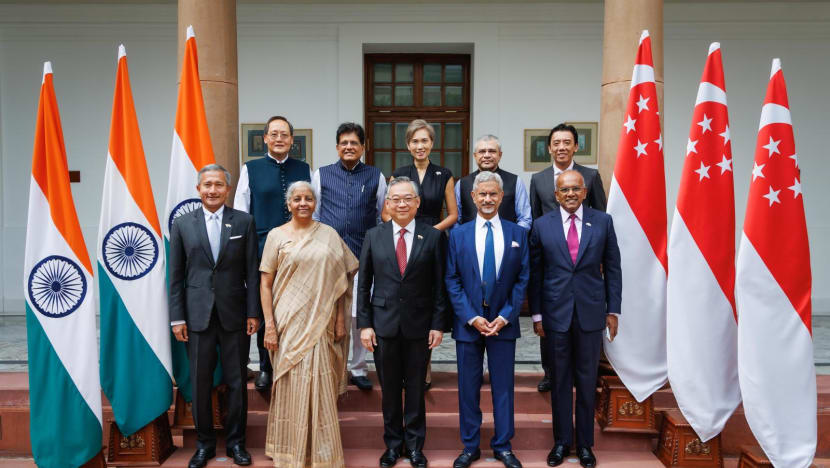Important for 'likeminded' partners to work together in an uncertain world, says DPM Gan after India trip
He was speaking to reporters from New Delhi, India, about the tie-ups discussed during the third India-Singapore Ministerial Roundtable.

Deputy Prime Minister Gan Kim Yong led a delegation to New Delhi for the third India-Singapore Ministerial Roundtable. (Photo: Ministry of Digital Development and Information)

This audio is generated by an AI tool.
SINGAPORE: As Singapore confronts a more challenging, uncertain and volatile landscape, it is important to work with "likeminded" partners like India to explore opportunities and deepen collaboration, said Deputy Prime Minister Gan Kim Yong on Wednesday (Aug 13).
He was speaking to reporters from New Delhi after attending the third India-Singapore Ministerial Roundtable, where leaders from both countries discussed ways to deepen cooperation between both countries.
This includes collaboration in areas such as sustainability, digitalisation, skills development, healthcare and medicine, and advanced manufacturing, the Ministry of Trade and Industry and the Ministry of Foreign Affairs said in a joint statement.
Elaborating on the specifics of these tie-ups, Mr Gan said there were discussions on setting up a semiconductor training centre as well as an "ecosystem" in India for Singapore companies to take advantage of. He noted that the semiconductor supply chain is very long and complex, often spanning a few countries.
“Therefore, it is important for us to continue to work with our partners regardless of the tariffs,” he said, referring to the US’ looming 100 per cent levy on semiconductors, which will not apply to companies that have made a commitment to manufacture in the US.
However, when asked if discussions with India had covered US tariffs on semiconductors and pharmaceuticals, Mr Gan said they had not.
“I think India is currently negotiating with the US, so we did not get into the details of a discussion on tariffs, specifically on pharmaceuticals,” he said.
Nonetheless, extending and expanding Singapore’s supply chain for semiconductors will make it more resilient, said Mr Gan, who is also the Minister for Trade and Industry.
“This will also give us more options and more alternatives in terms of where we source our components from and where we sell our products to.
“Both in terms of sourcing as well as market, we need to continue to expand and to diversify, and India is one area is that is very interesting for many of our companies,” he said.
Several Singapore companies are interested in investing in India’s rapidly growing semiconductor industry, and setting up an ecosystem there will ensure that people in India have the right skills to meet the needs of investors, said Mr Gan.
The Singapore delegation to India also included Coordinating Minister for National Security K Shanmugam, Minister for Foreign Affairs Vivian Balakrishnan, Minister for Digital Development and Information Josephine Teo, Minister for Manpower Tan See Leng, and Acting Minister for Transport Jeffrey Siow.
India's Minister of Finance and Corporate Affairs Nirmala Sitharaman, Minister of External Affairs S Jaishankar, Minister of Commerce and Industry Piyush Goyal, and Minister of Electronics and Information Technology, Railways, Information and Broadcasting Ashwini Vaishnaw participated in the roundtable.
The Singapore ministers also called on Indian President Droupadi Murmu, where they hailed the 60th anniversary of diplomatic relations.
As part of the trip, six business leaders from Singapore and 10 from India also took part in another business forum to discuss ways to strengthen partnerships between the business communities in both countries.
NURSES, INDUSTRIAL PARKS AND NUCLEAR
Singapore and India also discussed other areas of cooperation, including a training centre on maintenance, repair and overhaul (MRO) for the aviation industry anchored by the private sector, a collaboration on nurse training, a sustainability industrial park and nuclear energy.
Mr Gan noted that there may be challenges since each country has its own framework and national interests. For example, while Singapore is keen on an MRO business that can support Singapore Airlines, India would want it to support other airlines as well.
Likewise, Singapore companies may want the training to focus on a particular area, but India may prefer for the training centre to serve its wider economy.
On nurse training, Mr Gan noted that Singapore is already working with India to recruit nurses for Singapore's needs.
As the training curriculum differs from country to country, nurses from India who come to Singapore may need refresher courses, he added.
“We are working with the training institutes in India to see how we can adjust and fine tune the curriculum and training approach so that they are more aligned with what Singapore needs. So I think this will enhance the flow of nurses to Singapore,” said Mr Gan.
He also said Singapore indicated its interest in a sustainability related industrial park.
Such a park would focus on sustainable waste treatment and use cleaner energy sources. It would also attract companies producing sustainable products.
It is likely to be in the state of Rajasthan, he added. The state is located in northwest India and shares a border with Pakistan.
Regarding nuclear energy, Singapore wants to learn from India’s experience in running small modular reactors (SMRs), given that Singapore is studying the potential deployment of nuclear energy, said Mr Gan.
India has an indigenous nuclear energy programme, with most of its reactor development and construction done domestically.
As of last year, the country has 24 reactors that supply 8,180 megawatts of nuclear energy, according to the International Atomic Energy Agency. The Indian government has also laid plans to operationalize five SMRs by 2033.
Mr Gan said India has agreed to help Singapore get in touch with its atomic agencies to learn more about safety standards and regulations.
“But it’s still early days, we are still continuing to explore different technologies because some of the technologies are not mature yet,” said Mr Gan. “We will continue to monitor the development of nuclear technology, particularly in the (area of) nuclear energy.”















